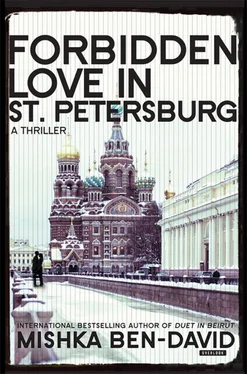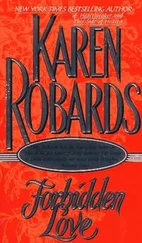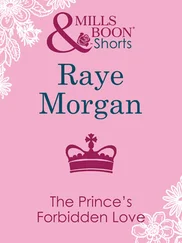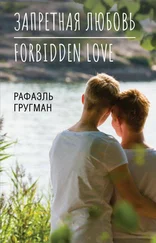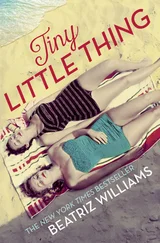I’d concluded my meetings and intelligence-gathering activities by mid-afternoon and, because I was booked on an evening flight back to St Petersburg, spent the few hours left to me strolling the streets close to my hotel. In one of the alleyways, Hebrew lettering momentarily stopped me in my tracks. I found myself in front of the Bukharian Synagogue. Like most of the houses it also had a courtyard with an additional building in it. One was used as a synagogue in the summer and in winter worshippers used the second building for prayers. I was mesmerized by the Hebrew lettering, the like of which I hadn’t seen since leaving Israel, and had forcefully to tear myself away, leaving the place in a great hurry.
THE IMMEDIATE EFFECT of my unexpected encounter with the synagogue in Dushanbe made me decide to visit the Grand Choral Synagogue in St Petersburg immediately after my return. I knew that in so doing I was committing a serious breach of security for which there was no justification. What’s more, going to a synagogue in no way chimed with my beliefs or my way of life, even in Israel.
My delight at the very sight of the building came as a surprise to me: a magnificent brown and white structure topped by a grey dome no less impressive than the great churches gracing the city. When I reached the guard at the entrance to the enclosure I hesitated for another moment or so and then, based on nothing more than a whim, decided to enter.
Where to? asked the guard in Russian.
I’m a Jew, I answered–also in Russian. Ya yevrei , and felt an inexplicable pride well up within. The guard gestured for me to enter.
I wasn’t wearing a yarmulke and so sat down on the bench at the far end closest to the entrance. The hall was impressive. There were two rows of pillars on either side supporting the upper tier reserved for women, and reaching all the way to the high-arched ceiling from which there hung a huge chandelier. The Holy Ark straddled the entire eastern expanse of the hall and its yellowish walls gave me a sense of warmth. Suddenly I felt at home. A strange emotion for someone who, at most, finds expression for his Jewishness through its nationalist and cultural aspects. However, in their absence, I was drawn to the synagogue and the synagogue reached deeply into the void within me. I sat there for a long time, not daring to go into the centre of the hall or to approach the Holy Ark. It took an effort on my part to tear myself away from the place. Enough, I said to myself. I’ve finished re-charging my internal batteries and there are limits to my transgressions.
I agreed to Anna’s earlier idea that at the weekend we should visit the graves of Dostoyevsky and Tchaikovsky. We met in Vosstaniya Square in the middle of Nevsky Prospekt. Do you know how this square came into being? Anna asked me. The Czar wanted to build an avenue from Nevsky’s place of burial to the Admiralty building. But two teams of road pavers advancing from two different directions strayed from the planned path and met up here.
The clouds covering the sky blocked off the little heat there was and Anna suggested we walk to the Tikhvin Cemetery in the Alexander Nevsky Monastery, where Dostoevsky, Tchaikovsky, and many other of St Petersburg’s great men of letters are buried. Why on earth are we travelling around on the metro and on foot and not by car, I thought to myself as we made our way towards the cemetery.
But I knew perfectly well why I didn’t have a car. In briefings before my departure it was pointed out that having a vehicle increases ones embroilment with the authorities, and the grey-uniformed traffic police, the DPS, are stationed at every crossroad and constantly carry out spot checks on cars. The purchase of a car also adds to the expenses that have to be officially accounted for, and the metro, tramways, and buses, make travel around the city easy. But I had no idea why Anna didn’t have a car and when I asked her she said: actually Mikhail and I did have one. Most of the time he was the one driving and after he died I sold it to ease my financial situation. I don’t miss it.
Just missing him, I thought to myself regretfully.
Ahead of us was a relaxed hour’s walk before we got to the Alexander Nevsky Monastery. As we strolled along, Anna delighted me with her great knowledge of the poets and authors who’d written about her beloved St Petersburg. Alexander Pushkin, she said–making sure to mention his first name in case I didn’t know it–did indeed describe the city’s aura in great detail. But of all his works about Peter the one I love most is The Bronze Horseman.
You must have seen the big statue of Peter the Great on a horse in Senate Square, she said. The poem’s hero, Yevgeny, has a great love who drowns in a flood. Yevgeny remonstrates with Peter for having built the city in a place prone to flooding. You know that this whole area was one big swamp, don’t you? And that’s also the meaning of the word ‘Neva’ in Finnish. A swamp. In any case, poor Yevgeny goes crazy, and in his delirium he is pursued through the city streets by the statue of Peter.
I said nothing about this savage confrontation between man and the state which Anna had taken the trouble to explain to me. After a long silence she continued with her enlightening account.
Nikolai Gogol–again informing me of his first name–though a Ukrainian, did most of his writing here. His Tales of Petersburg –perhaps you’ve read some of them–described the disparity between how things in the city seem and the true nature of their reality; a divergence that can lead a person to dream of things that cannot be, go crazy, and die.
Why is the wise Anna telling me all this? Is it perhaps her only way of describing the literature written here in Petersburg or is she trying to hint that something in me, and perhaps in her, something in my dreams and maybe in hers, is beyond realization. That the reality differs from what we see, think and feel. That the state will rear its head and stand between us and against our love.
We had reached the Monastery and chose to go first into the cemetery. In the burial grounds to the right, alongside the families of the nobility and close friends of Peter the Great, the city’s most renowned architects and composers had also won the right to small family plots. We stood facing Tchaikovsky’s large tombstone crowned with a big statue of the composer, behind him a huge angel and a cross, and in front a woman obviously reading from his compositions. Alongside Tchaikovsky were the more modest graves of Mussorgsky and Borodin.
We waited for a group of tourists to leave before approaching Dostoyevsky’s grave. Behind a small fence a grey tombstone was topped by a cross and below stood Dostoyevsky’s finely sculptured bust. The inscription was weathered and almost illegible. We stood there, holding hands.
Dostoyevsky was subjected to many transformative experiences before writing Crime and Punishment, Anna said. And if you read the book in depth you will see that St Petersburg’s contrasts, its inequalities, form the background to Raskolnikov’s deeds.
The thought of Raskolnikov, the murderer, and the realization that Anna had avoided using the word ‘murder’ and made do with ‘his deeds’ flashed through my mind. But before I was able to delve more deeply into that she continued her peroration.
Have you read The Double ? I said I hadn’t. There too Dostoyevsky presents St Petersburg as a city in which the imagined is truer than reality. Something of the hero splits off from him and turns out to be more successful than he was. As a consequence the real character becomes crazed.
I couldn’t but think about myself, Yogev Ben-Ari, losing control over his double, Paul Gupta, who proceeds to usurp my place in the world. I was overwhelmed by a sense of deep distress.
Читать дальше
